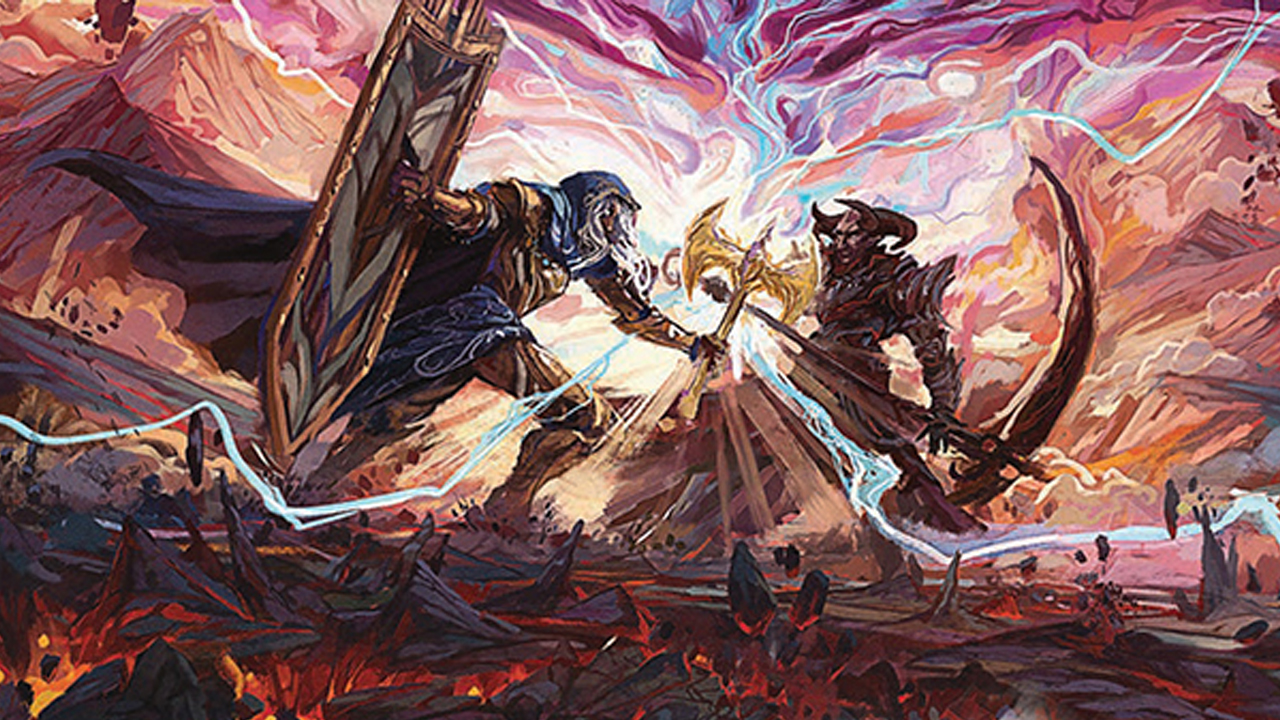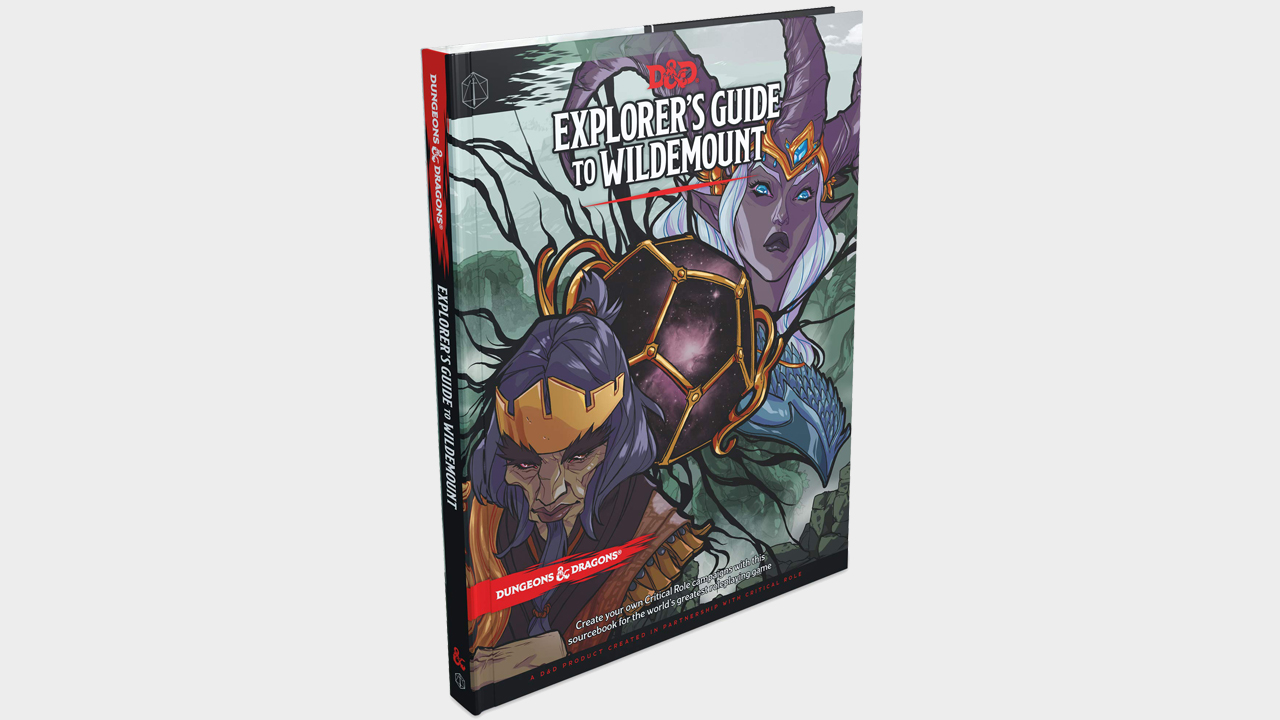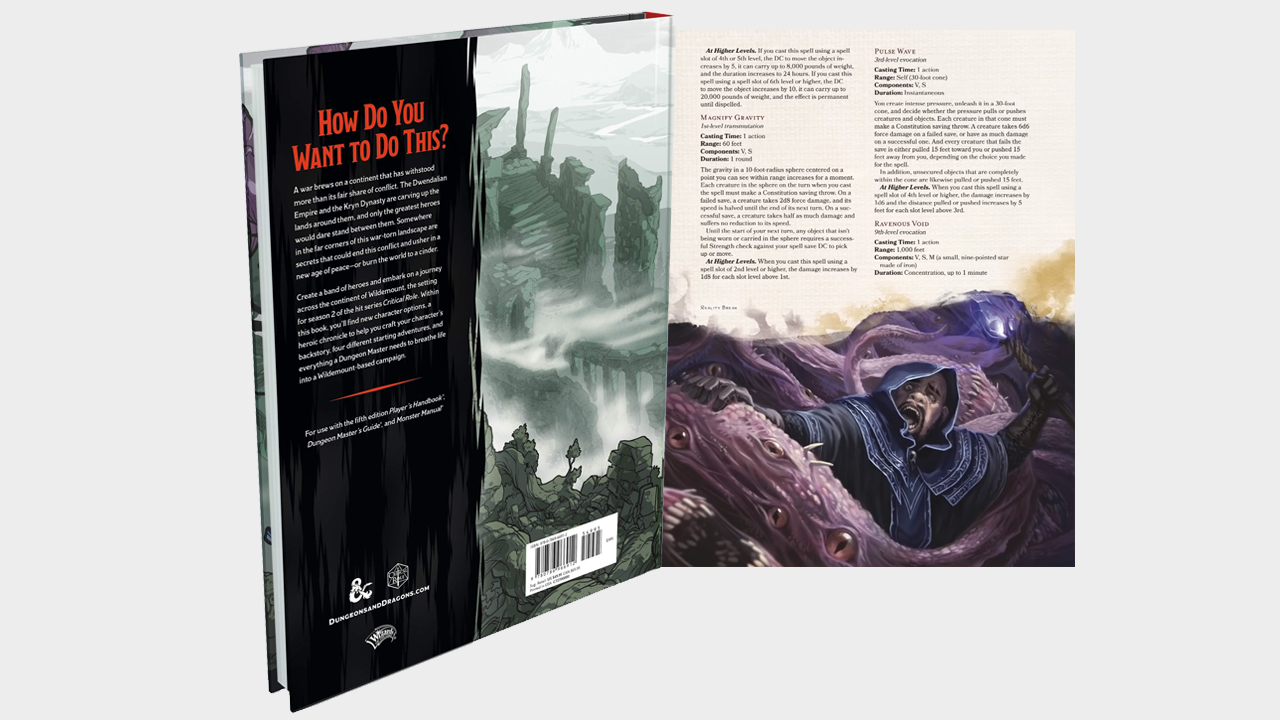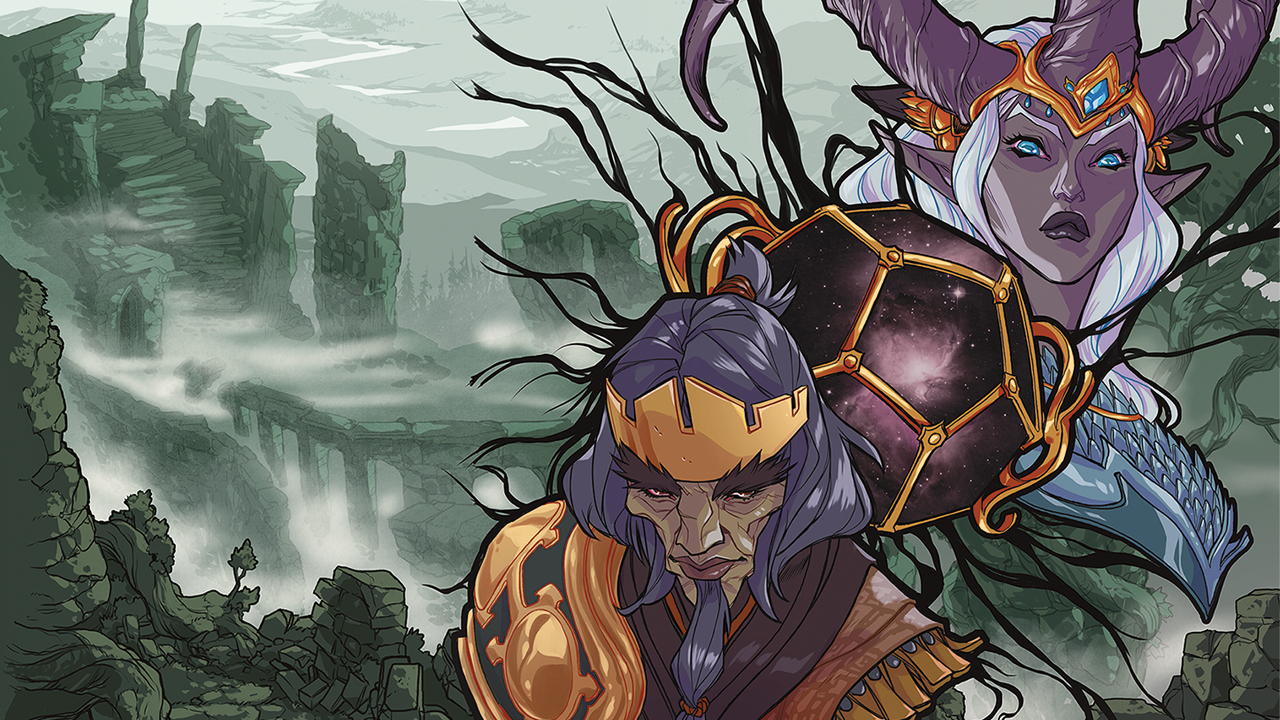GamesRadar+ Verdict
An essential purchase for Critical Role fans and anyone wanting to create their own D&D world.
Pros
- +
Crammed with insightful lore
- +
Fantastically imaginative
- +
Unique twists on old tropes
Cons
- -
Can be overwhelming
Why you can trust GamesRadar+

System: D&D 5e
Average price: $50 / £40
Features: New subclasses, spells, monsters, items, character creation tools, four introductory adventures, and lore from the world of Critical Role
The Explorer's Guide to Wildemount is enormous. And I don't necessarily mean in size; rather, it's absurdly broad in scope. A Dungeons & Dragons sourcebook that chronicles the world of the Critical Role series, it's everything fans of the Mighty Nein could want - particularly because the group's Dungeon Master, Matt Mercer, wrote and helmed much of it.
That makes Explorer's Guide to Wildemount a treasure trove of info. It's not incompatible with the rest of D&D, though. Rather, it compliments one of the best tabletop RPGs nicely. No matter whether you're looking to school yourself in a world you love or add spice to your own campaign, it's a must-have.
Shake it up
Much like Adventurer's Guide to the Sword Coast (which covers the region where Baldur's Gate 3 is set), the Explorer's Guide to Wildemount isn't afraid to go into the weeds on everything to do with that world. And I mean everything. Its chapters range from details about religion and gods to factions and cultural conflicts. If your instinct is to brush off a setting that 'only' supports a podcast and video series, you need to think again; even if you've never watched the show, this is a universe that stands on its own two feet. Especially with gorgeous art made by Critical Role fans.
That's because it doesn't rest on the laurels of its well-known heroes. Although the Mighty Nein are alluded to, they're kept far from the spotlight. This allows Mercer and the development team's world-building to shine through. The consistent creativity of this world is impressive, and it doesn't let up. You'd think that a 304-page tome that has its roots in traditional D&D would eventually run out of ideas, but that's absolutely not the case here. Instead, it rattles through dozens of unique concepts that add a fresh twist to classic tropes without running out of steam. There are cities built on the backs of giant, wandering turtles. Floating boat towns in the frozen north. The partially-exposed corpse of a worm-god trapped within the ice and excavated by locals for food. It's a fascinating, often bizarre setting that is eager to step away from traditional medieval fantasy.

The same is true of its factions. While the Dwendalian Empire fits the mold of a monarch-driven civilization of castles and knights, it's accompanied by tropical, swashbuckling islanders of golden beaches and jungles. Meanwhile, the Kryn Dynasty of Xhoras is a fascinating blend of dispossessed societies that everyone assumes are 'evil' - goblins, dark elves, and beast-folk. They're just fighting for their rights, and that hits very close to home right now. Basically, the book is rife with inspiration for Dungeon Masters looking to get new ideas.
The only downside of this depth is rooted in layout and the fact that it's a double-edged sword. It's all fantastically written, of course, but that information isn't always as scannable or user-friendly as it could be. Much like open-world video games where every inch of the map seems filled with collectibles and side-quests, that wealth of detail can become overwhelming. Similarly, even though the lore for each region is kicked off by a zoomed-in portion of the map, much of the chapter is presented as a wall of text that makes it easy to lose track of a location's position in relation to the others.
However, this is more of a niggle than a real problem. And to be perfectly honest, I can't gripe all that much when there are so many jumping-off points for your own adventures. Much like the Dishonored roleplaying game, Explorer's Guide to Wildemount has more quest hooks than I can count. Dozens of locations have ideas for stories and missions, and most left me buzzing to add to my own games.
Heroic chronicles
Because the book features most current D&D races, it's also a good depository for anyone who wants access to everything the game offers (including the cat-like tabaxi, goliaths, and tortoise-esque tortles). Most of the time, unusual picks like these are scattered across numerous, often-expensive products.
That value is only increased considering the addition of an all-new race - the soulless Hollow Ones - and original monsters such as the nergaliid devil toad. Unique backgrounds and multiple sub-classes like the reality-altering dunmancy school of magic are available to use as well, adding some welcome spice to existing wizard builds.

The most significant addition this book makes to D&D at large is the Heroic Chronicle system, though. This allows "players and Dungeon Masters to build a compelling character story" with numerous hometowns, rivalries, family sizes, relationships, favorite foods, and more to choose from. You can even throw in mysterious secrets and a prophecy if you'd like. Besides being very cool, these help the DM weave a tale around your character or subvert expectations. It's a clever way of helping those who want a complex adventurer without creating a multiple-page backstory. I'd love more sourcebooks to include the idea going forward.
Not that the Heroic Chronicle is the only way of getting your characters started in the world of Critical Role. Namely, Explorer's Guide to Wildemount features a clutch of mini-campaigns that serve as introductions to the continent's four regions. What's more, (and much like the Dungeons and Dragons Starter Set) they act as a taste of D&D's different playstyles - roleplaying, combat-fuelled dungeon-crawling, and exploration. Featuring memorable events that range from an underwater adventure in diving suits to the battle against a crazed inventor and his mech-like creation, they're every bit as creative as the lore that fills the rest of the book. Again, the formatting could be better, but this is forgivable due to the advice and tips that are laced throughout.
That's a good example of what makes Explorer's Guide to Wildemount work. It's a dragon's hoard of info for fans, but it's also a great way of easing new players into one of the best TRPGs there is. It's not selfish with its creativity, either - all of its ideas can be transferred or adapted to your own D&D world, be it in person or via the internet if you're learning how to play D&D online. That makes it a delight regardless of whether you're an avid follower of Critical Role or a DM looking to create your own setting.

I've been writing about games in one form or another since 2012, and now manage GamesRadar+'s tabletop gaming and toy coverage. You'll find my grubby paws on everything from board game reviews to the latest Lego news.



